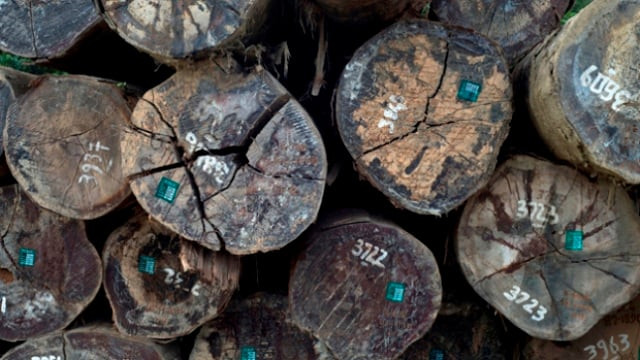Timber trouble: Karakoram forest cover vanishing
Deforestation leading to melting of glaciers; biodiversity degradation

This widespread deforestation and cutting of trees is not only impacting glaciers, which are receding faster than normal, but also impacting biodiversity. PHOTO: AFP
Though some efforts are afoot at national level to conserve and add to existing forests, the situation in Gilgit-Baltistan (G-B) would suggest that the battle is being lost.
Widespread deforestation and felling of trees has denuded large swathes of forest area in G-B.
According to experts, the continuous illegal felling of trees such as pine, kail and deodar, forest cover in G-B has eroded more than 50 per cent in the last 20 years --- down from 640,000 hectares to just 295,000 hectares.
This widespread deforestation and cutting of trees is not only impacting glaciers, which are receding faster than normal, but also impacting biodiversity, as rare animals such as of snow leopards, black bears, markhor, Himalayan ibex, blue sheep, Marco Polo sheep, and urial are disappearing from the region.
The experts, meanwhile, have called for rigorous monitoring of forest cover to compensate for the loss and to stop further depletion, besides planting limited eucalyptus trees in selected areas according to climatic zones.
They have also suggested that more and more fruit trees such as apricot, plum, pear, walnut, cherry, apple and pomegranate could be planted at dry and low water zones to counter the deforestation.
According to a recent research by Pakistan Meteorological Department (PMD), the impact of global warming, coupled with the impact of massive deforestation, has contributed to the glaciers of G-B receeding by 2.6 kilometres in the last 36 years.
“The land made available by recession of glaciers is very fertile and can be transformed into small orchids, as many fruit plants naturally grow at the ‘feet’ of the receded glaciers,” PMD Director Dr Ghulam Rasool told The Express Tribune.
He suggested that conifer seeds could also be dropped from helicopters in areas including Hunza, Nagar and Ghizer, where these are indigenous species, for sustainable forest management and to mitigate the impact of global warming.
Responsibility for forest management in G-B remained with the local communities till 1952, before they conditionally delegated management powers to the Forest Department under the Accession Deed.
Forests in G-B are categorised in three groups --- private forests, which spread over 2,196-square km in Chilas, Darel and Tangir, government protected forests covering 635-square kilometres in Gilgit, Skardu, Astore, Ghanche, Ghizer and Hunza-Nagar, and farmland forests spreading over 3743-sq km in different zones.
At present, 50 nurseries are operating on 10,000 acres in G-B.
Meanwhile, forest covered increased from 5,000 acres to 8,333 from 2001 to 2008, but gradually dropped to 2,666 acres in 2013 and fell further to 2,594 acres in 2014.
In 1993, the government of Pakistan imposed a ban on felling of trees from commercial forests, and after lifting the ban for one year, the government imposed it again in 2001, however, unscrupulous elements, with the connivance of forests officials, continue to cut and sell wood down country, causing major deforestation.
Among non-timber forest produces (NTFP), it is reported that over 60 species of medicinal plants such as ephidra, sea buck thorn, Artemisia, and chilgoza pine are also found in G-B, and if exploited scientifically, a handsome income could be generated from them. According to experts, low budgetary allocations, shortages of trained and well-equipped field staff, lack of cooperation among enforcement agencies, and a host of other issues were also contributing to the fast depletion of forest cover.
They called for strengthening the G-B Forest and Wildlife Department with sufficient ancillary and field staff and allocation of sufficient funds for conservation, regeneration and protection of G-B’s botanical resources.
Published in The Express Tribune, March 13th, 2015.



















COMMENTS
Comments are moderated and generally will be posted if they are on-topic and not abusive.
For more information, please see our Comments FAQ